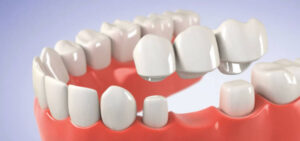Book a dental appointment
Dental prosthetics
If the lack of a perfect smile is due to missing teeth, there are several possible solutions. One of them is dental prosthetics.
No doubt many of us, when admiring the brilliant smiles of stars, have secretly dreamed of having the same perfect set of teeth. In fact, when it comes to appearance, the first thing people notice is the smile. That’s why aesthetic dentistry is gaining momentum. The greatest progress in this field has taken place, of course, in America, but Europe is also catching up fast.
Today, aesthetic dentistry offers a wide range of options to improve the appearance of your teeth: laminates, bridges, crowns, white fillings (composites) are just some of them. The rapidly advancing computer technology now offers ever more convenient ways to analyse your smile with the help of a computer – thus it is possible to alter the appearance of your lip line, gums and teeth on the computer before the actual procedure takes place.
Dental prosthetics is nowadays a broad field that is developing at a tremendous speed. The easy processability of the new materials allows personalised work to be performed even for the most demanding treatment cases. Modern materials are extremely durable, yet still natural-looking. The rapid technological advances and the latest treatment techniques are all at the service of patients, making it possible to do what was not considered possible only a short time ago.

Prosthetics
There are many possible solutions for replacing missing teeth:
- Removable dentures
- Non-removable or fixed dentures
We offer the following prosthetic treatment services in our clinic:
Four main reasons for getting dental crowns
- When a tooth is dying.
- When a tooth is broken.
- When a filling is no longer sufficient.
- When a tooth has changed colour.
Dental crowns can be used to successfully correct the bite height, the position and colour of teeth. Even after root canal treatment, it may be necessary to place a crown on the tooth to ensure sufficient strength to withstand the forces of mastication. Tooth crowns can be broadly divided into two types: all-ceramic crowns and metal-ceramic crowns
What to consider when crowning teeth?
- If the tooth has a live nerve, there is a risk that the tooth will remain sensitive after being filed down.
- Bacteria tend to accumulate under the edges of the crown and cause tooth decay.
- Under an artificial crown, the lifespan of a tooth is up to ten years.
- Ceramic crowns can chip.
Read more about our other dental treatment services here.
Read more about dentures here.
